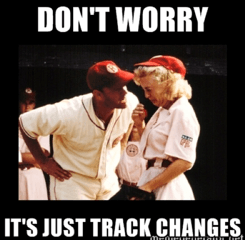 Dr. Freelance: I just received feedback from an author about the draft I edited, and I detected he was a little upset/surprised at the number of changes I made to his book. I suppose I could have warned him, but do you have any other suggestions to help take the sting out of the process?—Seeing Red
Dr. Freelance: I just received feedback from an author about the draft I edited, and I detected he was a little upset/surprised at the number of changes I made to his book. I suppose I could have warned him, but do you have any other suggestions to help take the sting out of the process?—Seeing Red
Red, at the risk of mixing sports, entertainment, and work metaphors, I’m reminded of Tom Hanks’s character Jimmy Dugan in A League of Our Own: “There’s no crying in baseball!” There’s no crying in freelance editing, or there shouldn’t be.
Before I get into any specific suggestions, however, let’s start with some perspective. My guess is that, as an editor, you excelled at and maybe even enjoyed school. When teachers commented on your papers, you understood the criticism (even if you didn’t like it), learned from it, and used it to improve your innate talents. Once you got into the workplace, you were personally edited or mentored by similar people who have extra-high standards (and strong opinions) about the finer points of language. In the process, you became immune to having your work edited.
Most people aren’t like that. They see Word’s Track Changes bleeding all over the page, and it brings back awful memories of Mrs. Krabappel destroying every essay they wrote. They take it personally, even though that’s not how our edits are intended.
Editing with Empathy
Authors range from hypersensitive to Teflon when it comes to being edited, and you can’t treat everyone the same. I’m not a particularly touchy-feely guy, but I am ultra-aware that I need to turn up the empathy when working with clients. That starts before I ever flip Track Changes to “ON,” and continues through the project:
- Assess the client’s experience and background, not just the document at hand. Has he written a book or lots of articles before, or is he new to the process? How confident does she sound about the editorial quality of her manuscript—and does that align with your opinion of it, based on the sample you’ve seen? Has he ever worked with an editor, freelance or otherwise, and if so, what was the experience like?
- Inform them about the process. Your average person may not think in terms of the language we use in the editing field or understand the differences between developmental editing, copyediting, proofreading, etc. Have an honest-but-kind conversation about what you’re recommending and why. Set the expectations for what that’s going to look like—but more important, emphasize how it will make their book better and more marketable!
- Don’t be a robot. When we’re in mission mode, plowing through dozens or hundreds of pages a day, it’s easy to forget that there will be a human being on the receiving end of our edits and comments. If there’s a passage that’s particularly insightful or interesting, I’ll insert a compliment in a comment; I also try to inject some light humor when I can. I’ll generally make comments in the so-called inclusive we—“We could make this section stronger by…”—rather than saying “You could…” It’s a subtle way of saying, “I’m on your side.”
- If you’re delivering a draft saturated with red pixels, give a heads-up. I work with the “highlight changes” function off because it’s too distracting. But before I send the document to the author, I’ll open it with everything on and scroll through, so I can see it from the client perspective. If it looks like the Spartan-Persian battle scene from 300, I’ll make sure to say something in my email to the effect of, “Hey Bill, just a warning that there’s quite a bit of red ink here. Please note, that’s *not* a reflection of the quality of your content, which is fantastic! I realize I’ve made a lot of edits and comments here, so please let me know if you have any questions about anything, and I’ll be happy to walk you through it.”
As with so many aspects of the freelance business, you need to consider the client’s experience with you, not just the end product you’re delivering. An author who feels like she’s been treated with dignity and respect, in addition to receiving high-quality editing, is going to come back to you with her next book—and sing your praises to her writerly peers, too.
In the comments: What’s your favorite strategy for handling a sensitive author?
Many years ago, I had an editor that used green pens instead of red, for exactly that reason.
Additional points awarded for the Mrs. Krabappel reference.
Mike, I wonder if there’s ever been a study on the impact of color on people’s acceptance of criticism.
KVK, I knew there would be some Simpsons fans lurking out there!
Excellent reminders! I use Tracked Changes, but in a different color than red (a little thing, but maybe subconsciously less alarming).
I set expectations when client contract is signed, and email a similar reminder with first round of edits, noting that authors have the final say.
I also try to present balanced feedback, both in email and Comments, noting any particularly effective wording or impactful sections.
Thanks for commenting, Julia. Setting expectations and balanced feedback are incredibly important parts of the equation.
I particularly like your suggestion about editing with empathy: “We could make this section stronger by…” That kind of stuff really makes a difference.